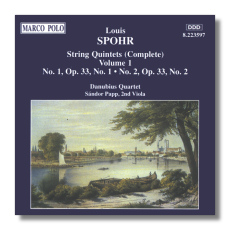
The Internet's Premier Classical Music Source
Related Links
- Spohr Reviews
- Latest Reviews
- More Reviews
-
By Composer
-
Collections
DVD & Blu-ray
Books
Concert Reviews
Articles/Interviews
Software
Audio
Search Amazon
Recommended Links
Site News
 CD Review
CD Review
Louis Spohr

String Quintets, Volume 1
- Quintet #1 "Grande Quintetto" in E Flat Major, Op. 33/1 (1814)
- Quintet #2 "Grande Quintetto" in G Major, Op. 33/2 (1813)
Danubius Quartet
Sandor Papp, viola
Marco Polo 8.223597 (Naxos) 68min
Spohr was the foremost German violin virtuoso of his time. Indeed, his only serious rival on the international scene was Paganini, who publicly admired his competitor's singing tone. Mendelssohn found Spohr's use of staccato runs amazing and declared that no one could imitate his unusual technique. Spohr's original compositions were not regarded nearly has highly as his playing. George Bernard Shaw wrote off the Septet as "a shining river of commonplaces, plagiarisms, and reminiscences". Ignaz Franz von Mosel lambasted Spohr's first String Quintet for the"eternal re-chewing of the theme (of the first movement) in every voice and key…" Others criticized his chamber works for the excessive brilliance of the writing for the first violin - written for Spohr himself to play. While Keith Warsop assures us in his notes for this recording of the first two string quintets that "Spohr gives the other instruments plenty to do so that the virtuoso writing for the first violin part is usually underpinned by thematic connections in the other parts…" the simple fact is that everyone takes a back seat to the hyperactive first fiddler. The subtle interplay of voices that we expect in great chamber music is completely missing here.
Given the complexity - not to mention the sheer bulk - of his first violin parts, any ensemble which proposes to perform Spohr's early quintets should have a strong-willed and exceptionally gifted leader, such as Heifetz or Gidon Kremer. Maria Szabo of the Danubius Quartet simply does not fill the bill. Her unimaginative playing does nothing whatsoever to relieve the monotony of Spohr's endless cascade of notes from the first violin, and her instrument's whining quickly becomes tiresome. Tempos vary only slightly from one movement to the next, and dynamic contrasts are likewise homogenized. Rhythms are slack and flaccid. While the results might not disturb your dinner guests, they unfortunately do not stand up well to serious listening. This is Volume 1 in a cycle of the complete Spohr String Quintets. Let us hope for more exciting performances - not to mention better music - next time around.
Copyright © 1996, Thomas Godell


















